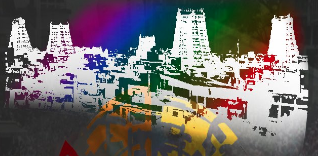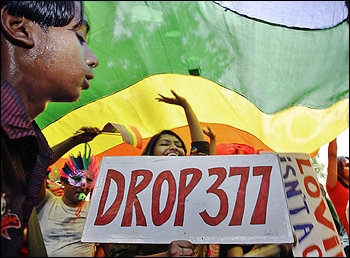Telling Our Stories
By Sivagami Subbaraman
[Talks given at various Washington DC Asian and S. Asian LGBTQ community organizations]
Our lives are about silences. Our lives—as trans, as khush, as gender queer, as shiva-shakti, as bisexuals, as lesbians, and gay people –are about silences. The silence of knowing and of not-knowing. Of acceptance and of denial. The silences of our families and communities about all of who we are. And then there are the silences within us–we are both silent and silenced by fear and by love: fear of our family and love of our family that holds us all in thrall.
I came to the US exactly 25 years ago. I arrived a Tamilian, a Brahmin, a Feminist, a divorced woman—each of these descriptors invoking a particular gestalt. In the years that have followed, I became the wrong “Indian,” an East Indian, a third world citizen, a woman of color, an Indian American, and most recently a S. Asian. I was a Non-Resident Alien, and now am a Resident one; and when I go across spaces to what I still call “home,” I have become a compact, Americanized acronym: NRI—Non-Resident Indian. My personal story is not important except as it gestures to those larger social, political and cultural landscapes that shape and reshape our identities—and the constant making and remaking of our self-markers.
And of what exactly are we afraid to speak? I ask all of you to look at me: in the US, I am constructed quite simply as S. Asian, and in one of the following slots: LGBT. But my identity as a member of Khush is neither simple nor singular. Because to ourselves we are NOT S. Asian: we are Sri Lankan, Nepali, Bhutanese, Bangladeshi, Burmese, Afghani, Iranian, Malaysian, Pakistani, and Indian; we are Muslim, Sikh, Zoroastrian, Parsi, Buddhist, Hindu; we are from Bihar and Punjab (across borders) and Kashmir and Assam and Dacca and Khulna and Northwest Frontier Province an Jaffna and Trincomalee; and as if this were not quite enough we are chettiar and sunni and gajjar and brahmin and sanketi and burgher and moor and malay; and we are Tamilian from Tamil Nadu and Sri Lanka; and we can be Mirpuris and Saraswats. And of course we are FOBs and ABCDs and ABCDEFGs.
Why do I invoke this laundry list of identities?
I want to suggest that these are the unspoken histories of our identities as Khush—the hidden freight of our silences. And these shape and inform how we think of gender and therefore of sexuality and sexual orientation. Our understandings of our selves as men/women, male/female—from clothing to hair to appearance to emotion to attitude to desire and attraction ––is a dance at the intersections of all these multiple identities. In simple terms: we must understand our Khush identities in the context of our religion, caste, region, language, and geographies.
Our gendered selves then are deeply cultural—and so are our sexual selves. After all, we cannot and should not understand our sexual selves apart from our gendered selves. And yet, by and large, much of what I speak about here is irrelevant and tangential to the US LGBT context, and remains subterranean to our community identity as we try to fit our many selves into the neat and angular acronym: LGBT.
And so here are two moments in time: My niece who goes to grad school here came recently to stay. She has known me since the age of 2 as “mami”- the wife of her ‘mama’ —and for over twenty years I have been her favorite mami. There was nothing in her worldview or upbringing to prepare her for the transitioning of her favorite mami to “a queer mami.” And after long conversations of anger, pain, loss, and laughter, she could re-admit me into her life as her queer and favorite mami.
Another moment: a young man in the LGBT community whom I met several years ago as a fellow community organizer, started to call me “kaki. He was in search of a kaki in a lgbt world filled it seems with just friends, boyfriends, exes and khushgirls. And just recently he performed pranam for me–that ancient Hindu gesture seeking my blessings.
Two different moments. Moments suspended in time and space. Moments of healing when those competing identities—always held apart, always put asunder-came together. And I could be “mami” and “queer”, a “lesbian” and “kaki” all at the same time.
The lives of heterosexuals are all about ANDs, not ORs. For over twenty years, I have been trying to “come out” in the US –as a Tamilian (whose cultural and political ethos was often marginalized in the national politics of that time); AND as a Brahmin (shaped by the anti-brahmin rhetorics and politics which gave me a particular sense of my privilege and put my marginalizations in context); AND as a feminist shaped as much by Sivasankari (a Tamil writer) as Virginia Woolf; AND as a woman married to a man who chose to walk in the queer world; AND as an activist and an academic. The US however demanded a somewhat uni-dimensional coming out: a singular, lean lesbian.
For those of us who live at the intersections of several identities, we often struggle to find a space we can call “home.” And often it seems that home is in those gaps. Those fissures. Those fragments. Despite our theoretical emphasis on intersections, we live in a binary world that makes our multiple identities oppositional. Conflicted. Competing.
Moments of simultaneity and wholeness are perhaps a gift in any world. And the few moments that I have felt “whole,” when I can be Brahmin&queer&tamilian&feminist & wear a sari & jeans & dance to the blues as much as to the Bhangra,—such moments have been rare and few; and when I think about it, these would not be remarked upon in the hetero world at all, where such togetherness is an everyday, lived reality. And yet, in our world, it is infrequent. And it should be our right to have—as individuals and as a community.
And my career—such as it has been in the US—has followed the same trajectory: the US academy wanted me to be post-colonial, rather than a teacher of African American literature; wished for me to be international rather than see me as a US feminist of color; and did not give me authority to cross disciplinary boundaies. The injunction to teach who we are rather than what we know, the continued push to color-code and fit into neat boxes of disciplinary expertise and specialties have dogged my various attempts at teaching. And so here I am: an accidental administrator. And so it is not so very odd at all that I should now be working –a Tamilian Brahmin woman at a Catholic/Jesuit school –doing LGBT work—that very paradox offering me the most creative space yet to re-make myself as madisaar dyke.
In the decade that I have spent in these varied communities, I have come to learn this as the deepest lesson: that there is NO LGBT community out there really. It is our particular challenge in the lesbian, gay, bisexual, and transgender communities—it is our particular challenge that we must all BUILD community even as we seek to find our selves. Unlike most other groups that are built around racial, ethnic, religious identities—we in the LGBT world must constitute our communities even as we struggle to define our own identities—and this can prove arduous, difficult, contrary, and be plain exhausting.
The variegated diversities of our communities means that our shared spaces can be the fault-lines or they can be the bridges as we try to hew home out of these fragments; and I have not even started to itemize the laundry list of identities when we consider that lean slashed US acronym: A slash PI (A/PI). As A slash PI LGBT we are often invisible to ourselves and to others in our diversity —as we are asked to fit into the US demand for a monochromatic understanding of racial differences. And we can not begin to be part of those national conversations until and unless we can first address these issues among ourselves.
Most of us here are in voluntary groups—we are not registered organizations in any form or fashion, and yet we are often called upon to function as if we are. And this tension between who we are, who we are perceived to be, and who we perceive ourselves to be has been both generative of the best we can be, as it has also been deeply divisive and restrictive.
So I want to use this moment to CALL OUT to our selves—to hold ourselves accountable to each other and for each other—because we are the community we seek to build and to find, and we are each responsible for and capable of building this community. So to all those who come seeking for Khush (LGBT group in DC), or APIQS (Asian Pacific Islander Queer Sisters) or AQUA (Asian Queers United for Action)—I want to say : there is no aqua, or apiqs or khush apart from YOU. We have to be that which we want to find. And that is the mystery and the paradox of our community work.
And that is why I think our places of coming out need to be spaces of coming together—of all of who we are and who we can be. And creating such feminist spaces is about making our universe large—so that such competing and conflicted binaries can come together as shimmering, shining possibilities. Each moment making possible the next.


![[poem] For Us](https://orinam.net/wp-content/uploads/2024/01/WhatsApp-Image-2024-01-03-at-23.58.42-768x768.jpeg)

